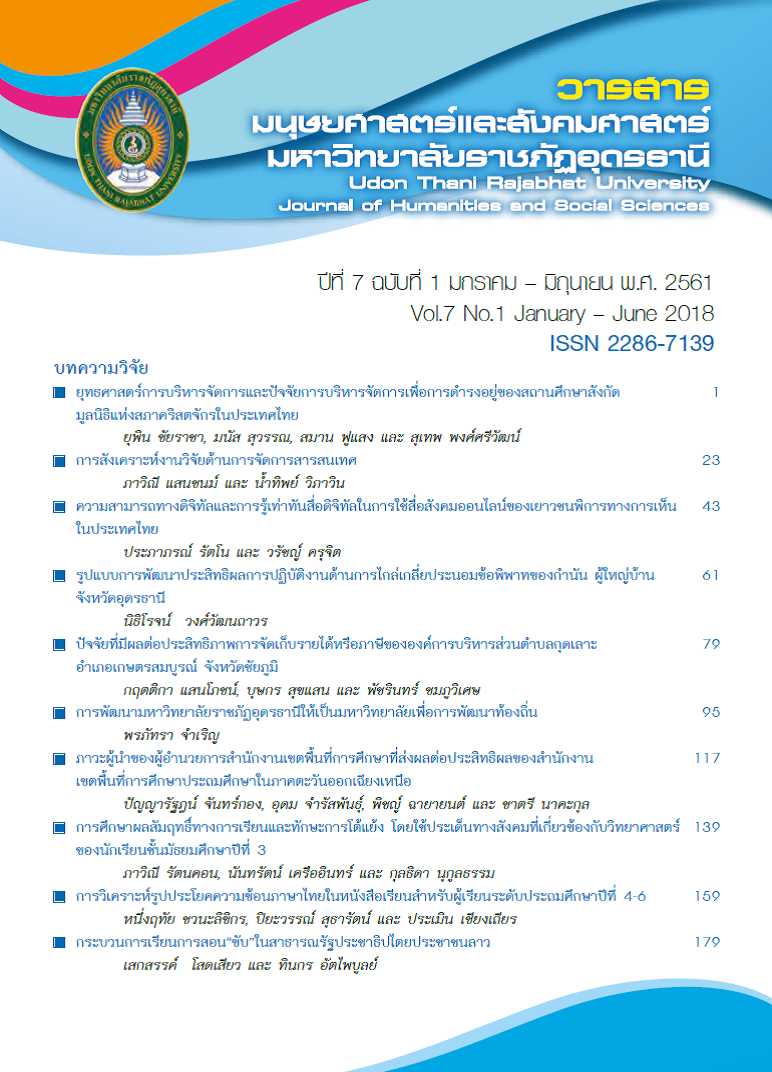การศึกษาผลสัมฤทธิ์ทางการเรียนและทักษะการโต้แย้ง โดยใช้ประเด็นทางสังคม ที่เกี่ยวข้องกับวิทยาศาสตร์ของนักเรียนชั้นมัธยมศึกษาปีที่ 3
Main Article Content
บทคัดย่อ
การพัฒนาทักษะการโต้แย้งให้กับผู้เรียนสามารถช่วยให้ผู้เรียนเข้าใจแนวคิดวิทยาศาสตร์มากขึ้น การจัดการเรียนการสอนวิทยาศาสตร์โดยใช้ประเด็นทางสังคมที่เกี่ยวข้องกับวิทยาศาสตร์เป็นแนวทางหนึ่งในการส่งเสริมทักษะการโต้แย้งให้กับผู้เรียน เนื่องจากผู้เรียนต้องคิดวิเคราะห์ ใช้แนวคิดวิทยาศาสตร์และนำหลักฐานที่น่าเชื่อถือมาเป็นเหตุผลในการตัดสินใจ งานวิจัยจึงมีวัตถุประสงค์เพื่อศึกษาความสัมพันธ์ระหว่างทักษะการโต้แย้งกับผลสัมฤทธิ์ทางการเรียนของนักเรียนในระดับชั้นมัธยมศึกษาปีที่ 3 จำนวน 36 คน ที่มีผลการเรียนวิทยาศาสตร์อยู่ในเกณฑ์ดี โดยเครื่องมือที่ใช้ในงานวิจัยประกอบด้วย แบบวัดผลสัมฤทธิ์ทางการเรียน แบบวัดทักษะการโต้แย้ง และเกณฑ์การประเมินทักษะการโต้แย้งโดยใช้ประเด็นทางสังคมที่เกี่ยวข้องกับวิทยาศาสตร์ที่ผู้วิจัยได้พัฒนาขึ้น จากการศึกษาพบว่านักเรียนกลุ่มเป้าหมายมีผลสัมฤทธิ์ทางการเรียนอยู่ในเกณฑ์ดี แต่นักเรียนส่วนใหญ่มีทักษะการโต้แย้งอยู่ในระดับปานกลาง เนื่องจากนักเรียนไม่นำแนวคิดวิทยาศาสตร์ที่เกี่ยวข้องมาตอบคำถาม ส่งผลให้สัมฤทธิ์ทางการเรียนไม่มีความสัมพันธ์กับระดับทักษะการโต้แย้ง ซึ่งผลจากการศึกษานี้จะเป็นข้อมูลพื้นฐานที่สำคัญในการนำไปใช้พัฒนาการจัดการเรียนรู้โดยใช้ประเด็นทางสังคมที่เกี่ยวข้องกับวิทยาศาสตร์ เพื่อส่งเสริมทักษะการโต้แย้งของผู้เรียนต่อไป
Article Details
References
Driver, R., Newton, P., & Osborne, J. (2000). Establishing the norms of scientific argumentation in classroom. Journal Science Education, 84(3), 287-312.
Erduran, S., Simon, S., & Osborne, J. (2004). TAPping into Argumentation: Developments in the Application of Toulmin’s Argument Pattern for Studying science discourse. Journal Science Education, 88, 915-933.
Garcia-Mila, M., Gilabert, S., & Felton, M. (2013). The Effect of Argumentative Task Goal on the Quality of Argumentative Discourse. Journal Science Education, 97(4), 497-523.
Jho, H., Yoon, H. G., & Kim, M. (2014). The Relationship of Science Knowledge, Attitudeand Decision Making on Socio-scientific Issues: The Case Study of Students’ Debates on a Nuclear Power Plant in Korea. Journal Science and Education, 23(5), 1131-1151.
Khun, D., & Udell, W. (2003). “The Development of Argument Skills” Child Development, 74(5), 1245-1260.
Lin, S.S. (2014). Science and Non-Science Undergraduate Students’ Critical Thinking and Argumentation Performance in Reading a Science News Report. International Journal of Science and Mathematics Education, 12(5), 1023-1046.
Lin, S. S., & Mintzes, J. J. (2010). Learning Argumentation Skills Through Instruction in Socioscientific Issues: The Effect of Ability Level. Taiwan: National Science Council. International Journal of Science and Mathematics Education, 8, 993-1017.
Ogan-Bekiroglu, F., & Belek, D. E. (2014). Impact of Model-Based Teaching on Argumentation Skills. International Journal of Progressive Education, INASED, 10(1), 59-72.
Okumus, S., & Unal, S. (2012). The Effects of argumentation model on students’ achievement and argumentation skills in science. Procedia-Social and Behavioral Science, 46, 457-461.
Organisation for Economic Co-operation and Development. (2012). “Committee on Conceptual Framework for the New K–12 Science Education Standards” Equity and Quality in Education: Supporting Disadvantaged Students and Schools. Retrieved March, 10, 2015, from https://www. oecd.org/education/school/50293148.pdf.
Oulton, C., Dillon, J., & Grace, M. M. (2004). Reconceptualizing the teaching of controversial issues. International Journal of Science Education, 29(4), 411-423.
Sadler, T. D., & Donnelly, L. D. (2006). Socioscientific Argumentation: The effects of content knowledge and morality. International Journal of Science Education, 28(12), 1463-1488.
., & Fowler, S. R. (2006). A Threshold Model of content knowledge transfer for socioscientific argumentation, Journal Science Education, 90(6), 986 - 1004.
., & Zeidler, D. L. (2003). “Weighing in on Genetic Engineering and Morality: Students Reveal their Ideas, Expectations, and Reservations” Annual Meeting of the National Association for Research in Science Teaching. Retrieved March, 25, 2015, from https://www.eric.ed.gov.
Sampson, V., & Clark, D. V. (2008). Assessment of the ways Students Generated Arguments in Science Education: Current Perspectives and Recommendations for Future Direction. Journal Science Education, 92(3), 447-472.
Shamos, M. H. (1995). The myth of scientific literacy. New Brunswick, NJ: Rutgers University Press.
Shoulders, C. W., & Myers, B. E. (2013). Socioscientific issues-based instruction: An investigation of agriscience students’ content knowledge based on student variables. Journal of Agricultural Education, 54(3), 140-156.
Tiang, N. H., & Mei, C. S. (2014). Making Thinking Visible In Classroom Via Scientific Argumentation. Proceedings of the International Science Education Conference 2014. National Institute of Education, Singapore, 1252-1267.
Toulmin, S. E. (2003). The Uses of Argument. 2nd ed. Cambridge, UK: Cambridge University Press.
Venville, G.J., & Dawson, V. M. (2010). The Impact of a Classroom Intervention on Grade 10 Students’ Argumentation Skills, Informal Reasoning, and Conceptual Understanding of Science. Journal of research in science teaching, 47(8), 952-977.
Walker, J. P., & Sampson, V. (2013). Learning to argue and arguing to learn: Argumentdriven inquiry as a way to help undergraduate chemistry students learn how toconstruct arguments and engage in rgumentation during a laboratory course. Journal of Research in Science Teaching, 50(5), 561-596.
Zeidler, D. L., Sadler, T. D., Simmons, M. L., & Howes, E. V. (2005). Beyond STS: A Research-based Framework for Socioscientific Issues Education. Journal Science Education, 89(3), 357-377.

